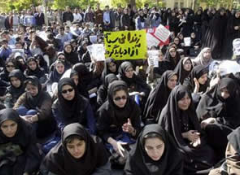
The US wants more and stronger dissent in Iran, and is pouring $75 million (US) into the effort. The program includes beaming media into Iran and the establishment of a State Department office devoted to promoting liberal democracy in the Islamic republic.
In seeking to overthrow the Islamic republic, it seems that the US hopes to smooth an intermediate path between revolutions in Central Asian countries like Georgia and Ukraine and attempts at social network creation and opposition building it used in Afghanistan and especially Iraq.
The US seeks to eliminate the regime by using civil society institutions instead of brute military force.
The attempt is predicated on false presumptions; one is strategic. U.S. officials wrongly assume that the Islamic Republic of Iran is vulnerable to collapse or overthrow, paving the way for a smooth transition to and subsequent consolidation of secular democracy. The administration's most dubious assumption, however, concerns the tactic through which these objectives are to be achieved.
State sees all
Fifty million dollars of the $75 million is to be devoted to beaming instantaneous and constant TV and radio broadcasts into Iran.
While programs with implicit and explicit political overtones can increase people's knowledge of the political world and raise their expectations, awareness of shortcomings by itself is woefully insufficient to bring about regime change or political transformation. As Trotsky observed, if the existence of privations was sufficient to cause rebellion, then the masses would always be in revolt.
The other $25 million, designed to empower organs of civil society and oppositional groupings inside and outside Iran and to facilitate student exchanges between the countries, assumes that these individuals and organizations can gain appropriate access to the Iranian masses and serve as bridgeheads for the promotion of democracy. In fact, nothing could be further from the truth.
All civic and political institutions have to operate under the close and watchful eye of the state in Iran. Any entity that is even remotely suspected of being in contact with foreign elements is immediately labeled as engaging in espionage and suppressed. The Islamic republic has for many years accused its opponents of being beholden to nefarious foreign entities. Now, students, academics and activists who decide to make use of the "dirty" American money will, in essence, be signing, if not their death warrants, then their arrest warrants.
The Bush pretext
Moreover, it should be remembered that Iran's civil society is divided into two sectors: modern and traditional. The traditional sector is religious, well-organized and quite cohesive. Financed by the regime itself, it has access to far more extensive resources than the meager sums being offered to the modern civil society by the US, and it encompasses the most passionate supporters of the regime.
The modern segment of civil society, on the other hand, has constantly been plagued by problems of organization, legitimacy, insufficient representatives and absence of sufficient numbers of dedicated adherents. At the same time, Iran's modern civil society has perennially had more potential than actual supporters. Fear of violent suppression, however, has consistently inhibited potential supporters from joining in.
The conservative establishment, meanwhile, has long been on the lookout for an excuse to crush Iran's modernist civil sector. Now the Bush administration has provided the regime with the pretext to proceed with the squelching and the potential supporters with additional disincentives from joining.
Helping the middle class
What to do? If the US is truly interested in laying the foundations for a peaceful and sustained transition to liberal democracy in Iran, it should abandon delusions that it can do so through such methods such as beaming satellite TV broadcasts and devoting funds to civil society promotion. The most potent boost to the empowerment of the modernist sector of civil society and a peaceful and sustained transition to stable democracy is a vibrant, propertied middle class that is preferably independent from the state sector.
The state in Iran derives 70 percent of its revenues from the sale of petroleum and the state dominates a staggering 80 percent of the county's economy. Most of Iran's middle and entrepreneurial classes are either directly or indirectly dependent upon the state. Furthermore, particularly among the youth, which compose 70 percent of Iran's population, the number of individuals belonging to the ranks of the propertied middle class is worryingly small.
The most effective way of enhancing the prospects for democracy in Iran is to help enlarge the private sector and to increase the number of individuals belonging to the middle class. This will not be achieved by spending a few miserly dollars on civil society promotion, while at the same time isolating the country economically. Prospects for a sustained transition to liberal democracy will be enhanced as Iran becomes more, not less, integrated into the global economy.
Border crossers
Other effective methods of reducing Iran's isolation include the removal of bothersome and humiliating restrictions, including fingerprinting of Iranian nationals, imposed on Iranians who, with extreme difficulty, are able to obtain visas to visit their relatives in the US.
Furthermore, investment in the social and nonprofit sectors and the cultural domain, (such as joint ventures for creating movies and books) cultural tourism and exchange between universities could prove constructive.
Providing nationwide wireless internet access via satellite installed in neighboring countries, which is technically possible, is another means by which the monopoly of information distribution inside the country could be broken.
Dariush Zahedi is a political scientist at the University of California at Berkeley. Omid Memarian, an Iranian journalist and blogger, is a visiting scholar at the university's Graduate School of Journalism. ![]()















Tyee Commenting Guidelines
Comments that violate guidelines risk being deleted, and violations may result in a temporary or permanent user ban. Maintain the spirit of good conversation to stay in the discussion.
*Please note The Tyee is not a forum for spreading misinformation about COVID-19, denying its existence or minimizing its risk to public health.
Do:
Do not: